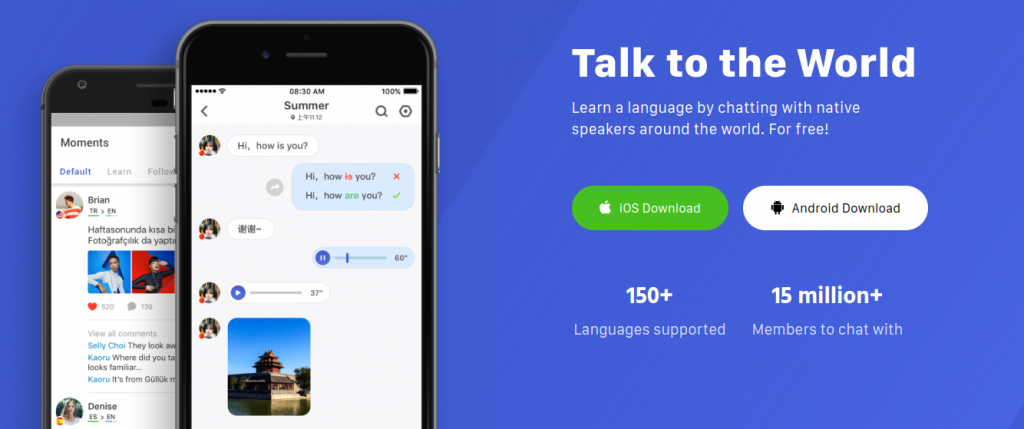3 powerful reasons to learn a language in retirement

After years of frugal living and investing in low-cost index funds, in 2016 I took early retirement from software engineering at age 43. I had always dreamed of retiring early to devote myself to my true passions for language learning and travel.
Despite being functionally fluent in four languages, I don't consider myself exceptionally talented at language learning. The key has been having the passion and perseverance to devote several hours a day to studying.
Finding a strong intrinsic motivation for learning is essential for sustaining a regular study routine. My inspirations for acquiring a language usually include fascination for that particular culture, upcoming travels to the country, and regular conversations with native speakers.
Switching between a variety of engaging learning resources also keeps things fun and prevents boredom and burnout.
Like achieving early retirement, becoming fluent in a language is the result of focus. I honestly believe learning a foreign language is accessible to anyone with the persistence to put in consistent study — and step out of their comfort zone to converse with native speakers.

3 powerful benefits of language learning for retirees
Language learning can be an ideal retirement pursuit. Here are three key reasons to learn a language for retirees of any age.
1. Exercise your brain
While I don't feel nostalgic for the stress of software engineering, I do miss the constant learning and intellectual challenge. Language learning has filled some of that gap.
Language study builds new neural connections, improves memory and concentration, and may even stave off dementia. It's a great way to maintain mental agility and defend your brain against aging after leaving your job.
Interestingly, studies indicate that multilingual people show improved attention to detail and are better at observing their surroundings. In my experience, learning a new language expands your worldview with new perspectives that wonderfully enrich your inner life and way of thinking.
2. Travel deeper
Familiarity with the local language provides more authentic travel experiences. That genuine connection to the native inhabitants and culture has become the most meaningful part of traveling for me.

Doing language study before your trip also provides practical benefits. You’ll be able to ask directions, negotiate prices, and read street signs and menus.
Even more gratifying are the special interactions you’ll have speaking with locals in their mother tongue.
For example, Latin Americans are some of the warmest and most welcoming people on the planet, yet language barriers make it tough to form more than superficial friendships if you can't speak their native language.
Take advantage of your hard-won free time in retirement through slow travel: spending a significant chunk of time in one place, building relationships, and deeply exploring the culture and language.
It's also much less stressful than constantly moving around!
Consider attending a language school coupled with a homestay. It’s a great way to make new friends and take a deeper dive into the local culture. There are Spanish schools all over Latin America and Spain, but you can also study Arabic in Cairo, Russian in Saint Petersburg, or Chinese in Taiwan, to name a few.
3. Improve your social life
Even if you weren't best friends with your coworkers, retirement can be isolating, as you're removed from the social environment of an office. Fortunately, language learning offers many opportunities to boost your social circle with interesting new friends from around the globe.
Getting to a conversational level
While the first phase of language learning for me typically involves self-study at home, for more social interaction, take a course at your local community college, university, or language schools like Instituto Cervantes or Alliance Française.
If you decide to learn solo, I recommend purchasing a grammar book with good reviews on Amazon to provide a basis for your studies, and supplementing by listening to language-learning podcasts or a self-study kit like Pimsleur in the car and at the gym. Check out Duolingo, a popular gamified learning platform. The flashcard apps Memrise and Anki are excellent for vocabulary drills.
The increased popularity of foreign-language content on Netflix and Amazon Prime also allows you to absorb new vocabulary in your target language with binge-worthy TV shows and movies.
Taking online classes
Once I reach A2 (advancer beginner level), I start meeting at least weekly for a conversation with teachers on iTalki.
iTalki is a convenient, affordable online platform that allows you to connect with teachers and language exchange partners.
iTalki’s paid lessons offer the choice of community tutors or professional teachers. Professional teachers have a teaching certification and classroom experience, while community tutors are native speakers — or near-native speakers — who can help you learn a language through informal tutoring or speaking practice.

While there are exceptional community tutors, my personal experience is that working with a professional teacher is well worth the extra cost. I search for instructors with five-star ratings and watch their introductory videos to get a feel for their style.
I then schedule lessons with a few different people to find someone I really click with.
It’s important to me to have a good rapport with my teacher since I learn best in an atmosphere of genuine connection and friendship.
After finding a teacher I love, I buy a discounted package of multiple lessons and meet with them once a week over Skype.
An added side benefit of iTalki is that I have become friends with several of my instructors. I’ve met up in person with teachers in Spain, Mexico, Ecuador, and Brazil!
Language exchanges
For a free method of language learning that promotes lasting international friendships, try an online or in-person language exchange.
Paying a teacher may be more efficient for language learning, but the true benefits of free language exchanges for me are the resulting friendships. These rewarding connections are the most meaningful way for me to learn about culture and language while helping others do the same.
Finding a language exchange partner online
iTalki allows you to find free language exchange partners. If you're a native English speaker, your skills are in great demand. Just set your iTalki profile to display in language partner search results, and you'll likely receive dozens of messages from native speakers of your target language eager to practice English.
I generally meet for an hour with my language exchange partners, half an hour in English and half in Spanish or Portuguese. We also message on WhatsApp to practice casual conversation and help each other with language questions.
HelloTalk is another free language exchange platform, a mobile app that allows you to connect with native speakers, chat with them, and help them acquire a command of your native language in return.

Language exchanges in your hometown
You can also find in-person language exchanges in your hometown organized through Meetup or through nonprofits that assist immigrants and refugees.
Also, try single-language Meetups where only your target language is spoken to hone your communication skills socializing with natives and other learners.
Language exchanges overseas
While traveling internationally, check Meetup and Couchsurfing for local language exchanges. These social gatherings are often popular and well-attended and an easy way to connect with friendly locals as well as other international travelers.
I’ve had great success with these events in Mexico, Brazil, Spain, and Russia — basically any place with locals highly motivated to practice English.
Language schools
Over the years, I’ve attended eight language schools in six countries: Egypt, Argentina, Uruguay, Mexico, Spain, and Brazil. After studying Portuguese in Portugal, my next language-learning project will be Russian, so I'm currently researching schools in Russia and the former Soviet republics.
On my list for future study are language schools for Italian in Tuscany, Chinese in Guilin, and Thai in Bangkok. You could say I’m a language school junkie!
I love language schools for the instruction but also the social aspect and opportunity for cultural immersion. They are perfect for solo travelers or couples.
For additional speaking practice and insight into the culture, try a homestay with a local family arranged by the school. While this requires a trade-off in terms of privacy and adapting to the host family's meal schedule, it’s possible to make lasting friendships this way, both with your hosts as well as with other students staying in the same home.
Most schools also offer free-time activities allowing you to get to know other students as well as locals. Sometimes the atmosphere at language schools is almost too social for an introvert like me, and I cut back on activities to get the alone time I need.
For Spanish, take advantage of the wealth of outstanding language schools in Latin America and Spain. I've studied in Buenos Aires, Argentina; Montevideo, Uruguay; Guanajuato, Puebla, and Merida in Mexico; and Madrid in Spain. To find a school, search for classes on TripAdvisor and Yelp. Look for schools with recent rave reviews that offer after-class activities. (For more tips, see my post on choosing a Spanish school).
Language schools don't have to be expensive. Prices are often very reasonable for a package including 20 hours of weekly classes and accommodation. For Spanish, Latin America, especially Guatemala, is very economical for language courses, but even Spain can be surprisingly affordable for group instruction.
Tip: Plan your travels to leverage local currency drops. For example, the weak ruble makes Russia much less expensive than it would have been a few years ago. Ditto for Mexico and Brazil.
After finishing a language course, I usually add on several weeks of travel time, allowing me to see more of the country and practice newly acquired language skills with the locals.
The polyglot community
If you decide to dive deeper into language learning, try joining the polyglot community, a devoted network of language enthusiasts that gathers online and at conferences each year. The polyglot community is exceptionally friendly and welcoming, and I've really enjoyed the events I've participated in. It feels like I've found my tribe!
So far I've just attended two online conferences with Women in Language, but plan to go to LangFest in Montreal in August 2019 as well as an in-person Women in Language conference in California in late 2019.
In the future, I also want to check out the Polyglot Gathering and Polyglot Conference, both of which are held annually at varying locations in North America, Europe, or Asia.
About me: A lifelong travel addiction
My parents emigrated to the US from Germany, and although I was born in the US, German was my first language. I studied Spanish at school and at 15 spent a summer in Mexico on a language exchange, starting a lasting love affair with Mexico.
At 16, I went on a yearlong exchange to German-speaking Switzerland.
After college, I took three gap years to work in the UK and backpack in Europe, the Middle East, and Asia, taking courses in Arabic and Italian along the way. Later in grad school, I informally studied Portuguese and spent a summer in Brazil getting to a conversational level.
Despite my love of languages, I made the practical decision to pursue software engineering as a career. Once my professional life started, I had limited time and energy for language learning.
To get a language and travel fix, I often explored Spanish-speaking countries on my vacations, immersing myself in the language as much as possible through conversation with the locals.
One year I spent two weeks in Argentina and Uruguay doing language study, but the time always felt too short!
Making up for lost time in retirement
Since retiring in 2016, I’ve tried to make up for lost time by devoting myself to language learning and travel. The first three years of retirement have been dedicated to visiting many bucket-list destinations, often combined with language study.
My lifetime goal is to speak seven languages to at least B2 level. (B2 is Upper Intermediate in the Common European Framework of Reference (CEFR), an international standard for defining language proficiency levels. Reaching B2 is a common benchmark for fluency.)
While upper intermediate is my minimum goal, for easier languages for an English speaker, like Spanish or Portuguese, my aim is C1 (Advanced). For more difficult languages like Russian or Chinese, I’d be pretty happy with B2!
Since retirement, my Spanish level has improved from intermediate to advanced though self-learning and stints at language schools in Mexico and Spain.
In 2018, I began to study Portuguese again, first at home and then at a fantastic language school in Rio de Janeiro. In late 2019, I'll be at another school in Lisbon, Portugal. Next year, I'm returning to the same Brazilian school for advanced classes and to experience Rio's famous Carnival celebration.
After Portuguese, I’m planning to take on the challenge of Russian with language study in Russia and the former Soviet republics. Eventually, I also want to tackle at least one Asian language like Mandarin Chinese, Japanese, or Thai.